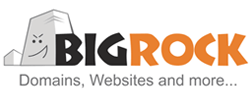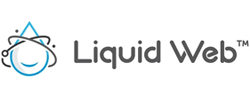30 Best Web Hosting Services Company
Last updated on January 19, 2025 by RGB Web Tech

Introduction of Cheap Web Hosting Service
Cheap web hosting service refers to a type of web hosting that is available at a low cost. This hosting service is suitable for individuals, small businesses, or anyone who needs a simple website without the need for advanced features or high-performance servers.
A cheap web hosting service usually offers a shared hosting plan, where multiple websites are hosted on a single server. This type of hosting service is typically less expensive than other hosting options like dedicated hosting or VPS hosting, as the cost of server maintenance and upkeep is shared among multiple users.
While cheap web hosting services may have some limitations, such as limited storage space or bandwidth, they can still provide users with the basic tools and features needed to create and manage a website. These features may include a website builder, email accounts, and access to cPanel or other management tools.
Overall, a cheap web hosting service can be a good option for those on a tight budget who need to get a website up and running quickly without the need for advanced features or customization. It is important to research different providers to find one that offers reliable service and good customer support, as well as a plan that meets your specific needs and requirements.
Table of Article Contents
- What is Web Hosting?
- Top 30 Cheap Web Hosting Service Providers
- Advantages of Cheap Web Hosting Service
- Disadvantages of Cheap Web Hosting Service
- Types of Cheap Web Hosting Service
- Paid V/S FREE Cheap Web Hosting Service
- How to choose Cheap Web Hosting Service?
- Features of Cheap Web Hosting Service
- FAQs
- Conclusion
- Video
What is Web Hosting?
Web hosting refers to the service of providing storage space and access to web servers to host a website on the internet. In simpler terms, web hosting allows individuals or organizations to make their website accessible via the World Wide Web.
When someone wants to access a website, they enter the website's domain name (such as www.example.com) into their web browser. The browser then sends a request to the web hosting server where the website is stored, and the server responds by sending the website's content back to the user's browser, which displays it on the screen.
Web hosting services can be offered by companies that specialize in web hosting, known as web hosts or hosting providers. These companies provide different types of web hosting plans, such as shared hosting, VPS hosting, dedicated hosting, and cloud hosting, each with different levels of performance, security, and scalability.
Web hosting also involves the use of various software and technologies to manage the hosting environment and provide website owners with tools and features to manage their websites, such as cPanel, FTP access, database management, and email hosting.
Overall, web hosting is an essential service that allows businesses and individuals to establish an online presence and make their website accessible to anyone with an internet connection.
Top 30 Cheap Web Hosting Service Providers
Here are the top 30 cheap web hosting service providers along with their sales, discount and pricing plans:
- Exclusive Sale - Upto 60% OFF
- Starting at
$9.99.00$3.49/month*
Inmotion Hosting
- Alexa Rank 5,622
- Exclusive Sale - Upto 75% OFF
- Starting at
$7.99$1.99/month*
iPage
Advantages of Cheap Web Hosting Service
Here are some advantages of using a cheap web hosting service:
1. Affordability: The most obvious advantage of using a cheap web hosting service is affordability. With low-cost plans, you can get started with your website without breaking the bank.
2. Easy to Use: Most cheap web hosting services provide easy-to-use control panels and website builders, making it easy for even beginners to set up their websites.
3. Scalability: Cheap web hosting plans often allow you to upgrade to higher plans as your website grows. This allows you to start with a basic plan and upgrade as needed, without having to switch to a new provider.
4. Technical Support: Despite being low-cost, most cheap web hosting services offer technical support around the clock to help you with any issues you may encounter.
5. Flexibility: Many cheap web hosting services offer a range of plans with different features, allowing you to choose the one that best fits your needs and budget.
6. Good for Small Websites: If you have a small website with low traffic, a cheap web hosting service may be all you need. You can save money on hosting fees and invest in other areas of your website or business.
7. Backup and Security: Even cheap web hosting services offer backup and security features, protecting your website from data loss and security breaches.
Overall, cheap web hosting services can be a great option for individuals and small businesses looking to launch their website on a budget. However, it's important to research and compare different providers to find the one that best meets your needs and budget.
Disadvantages of Cheap Web Hosting Service
While there are many advantages of using a cheap web hosting service, there are also some potential disadvantages to consider:
1. Limited Resources: Cheap web hosting services often have limited resources, such as storage, bandwidth, and processing power. This can affect the performance of your website and limit its scalability.
2. Reliability: With a low-cost hosting plan, you may experience more downtime or slower website loading times due to the sharing of resources among multiple users.
3. Customer Support: While many cheap web hosting services offer 24/7 customer support, the quality of support may be limited due to the lower price point. You may not receive as much help or expertise as you would with a more expensive hosting provider.
4. Limited Features: Cheap hosting plans may have fewer features and limitations, such as limited email accounts, no automatic backups, or no advanced security features.
5. Shared Hosting: Most cheap web hosting plans are shared hosting, which means your website shares the server with other websites. This can cause performance issues or security risks if one of the other websites on the server experiences a problem.
6. Renewal Costs: Some cheap web hosting providers offer promotional rates for the first year, but the renewal costs may be higher. This can catch some people off guard and cause unexpected expenses.
Overall, cheap web hosting services can be a good option for those on a tight budget, but it's important to consider these potential disadvantages and do your research before making a decision. Look for a hosting provider that balances affordability with reliability, features, and customer support.
Types of Cheap Web Hosting Service
There are several types of cheap web hosting services available, each with its own advantages and limitations. Here are some of the most common types:
1. Shared Hosting:Shared hosting is the most common type of hosting, where multiple websites share the same server and its resources, including storage space, bandwidth, and CPU. It is an affordable option for small businesses and individuals who are just starting with their website.
2. WordPress Hosting:WordPress hosting is a specialized type of web hosting designed specifically for websites built on the WordPress content management system (CMS). WordPress is the most popular CMS in the world, used by millions of websites to create and manage their content.
3. Virtual Private Server (VPS) Hosting:VPS hosting involves a server that is partitioned into multiple virtual servers, each with its own resources, operating system, and control panel. It is a step up from shared hosting, providing more control, flexibility, and security.
4. Dedicated Hosting: With dedicated hosting, a website gets its own server, which means all the resources are exclusively dedicated to that website. This option provides the highest level of control, flexibility, and security, but it can also be expensive.
5. Cloud Hosting:Cloud hosting involves a network of interconnected servers that work together to provide hosting resources. This type of hosting is highly scalable, flexible, and reliable.
6. Managed Hosting:Managed hosting involves a hosting provider managing and maintaining a website's server, including updates, security, backups, and more. This option is ideal for those who do not have the technical expertise to manage their own server.
7. Reseller Hosting:Reseller hosting allows individuals or businesses to purchase hosting resources from a hosting provider and resell them to their clients, usually at a higher price. It is a way to start a web hosting business without the need for expensive infrastructure.
8. Colocation Hosting:Colocation hosting, also known as colo hosting or colocation, is a type of web hosting where a company or individual rents space in a data center to store their own servers and equipment. Unlike traditional web hosting, where a hosting provider owns and manages the servers, in colocation hosting, the client owns and manages their own servers and equipment.
9. Self Service Hosting:Self-service hosting, also known as unmanaged hosting, is a type of web hosting where the client is responsible for all aspects of managing their website, including server configuration, software installation, security, and maintenance. The hosting provider only provides the physical server hardware and internet connectivity, but no management services or technical support.
10. Cluster Hosting:Cluster hosting, also known as cloud hosting or clustered web hosting, is a type of web hosting that uses a cluster of servers to host websites and applications. In a cluster hosting environment, multiple servers work together to provide greater performance, scalability, and reliability than traditional hosting options.
Paid V/S FREE Cheap Web Hosting Service
When it comes to web hosting, you often get what you pay for. While free hosting may seem like an attractive option for those on a tight budget, there are some key differences between paid and free cheap web hosting services that you should consider.
Paid Web Hosting Service:
Advantages:
- More reliable: Paid web hosting services typically offer more reliable and consistent performance than free hosting services.
- More resources: Paid hosting plans typically offer more resources, such as storage, bandwidth, and processing power, than free hosting plans.
- Better customer support: Paid hosting providers often offer better customer support, with faster response times and more experienced technicians.
- More features: Paid hosting plans typically offer more features and tools, such as automatic backups, advanced security features, and website builders.
Disadvantages:
- Cost: Paid hosting plans come with a cost, which may be a barrier for those on a tight budget.
- Contract length: Many paid hosting providers require a minimum contract length, which may not be suitable for those who are unsure about their website's future needs.
Free Web Hosting Service:
Advantages:
- No cost: The main advantage of free hosting is that it's free, making it a good option for those on a tight budget.
- Easy to use: Free hosting services often offer simple and easy-to-use website builders and control panels.
- No contract: Free hosting services typically don't require a contract, which provides more flexibility.
Disadvantages:
- Less reliable: Free hosting services often have limited resources and may not offer consistent performance or uptime.
- Limited features: Free hosting plans may have limited features and may not offer advanced tools such as automatic backups or advanced security features.
- Limited support: Free hosting providers may not offer as much support as paid providers, and the support may not be as experienced or responsive.
- Advertisements: Some free hosting services display advertisements on your website, which can be distracting or unprofessional.
Overall, if you're serious about your website and want reliable performance, more features, and better support, paid hosting is generally the better choice. However, if you're on a tight budget and don't need advanced features, free hosting can be a good option to get started.
How to choose Cheap Web Hosting Service?
Choosing the right cheap web hosting service can be a daunting task, especially if you're new to web hosting. Here are some key factors to consider when choosing a cheap web hosting service:
1. Reliability and Uptime: Choose a web hosting company that has a reputation for high uptime and reliability. You want a provider that guarantees at least 99.9% uptime, ensuring that your website is always available to visitors.
2. Server Speed and Performance: Choose a web hosting provider with fast servers and high performance. Slow-loading websites can negatively impact user experience and search engine rankings.
3. Scalability and Flexibility: Choose a web hosting provider that can scale and grow with your website. Your hosting plan should allow you to easily upgrade or downgrade your resources as your needs change.
4. Security: Choose a web hosting provider that takes security seriously, with measures such as SSL certificates, firewalls, malware scanning, and regular backups to protect your website and data.
5. Customer Support: Choose a web hosting provider that offers reliable and accessible customer support, with multiple channels such as phone, email, and live chat available 24/7.
6. Pricing and Value: Choose a web hosting provider that offers a good balance between pricing and value, with transparent pricing and no hidden fees. Compare pricing and features across multiple providers to find the best fit for your needs and budget.
7. User-Friendly Control Panel: Choose a web hosting provider that offers a user-friendly control panel, such as cPanel, which allows you to easily manage your website, email, and other hosting features.
By considering these factors, you can choose a best website hosting service that meets your need and provide a reliable platform for your website.
Features of Cheap Web Hosting Service
Cheap web hosting services may vary in terms of the specific features they offer, but here are some common features you can expect from a good cheap web hosting service:
1. Storage Space: Web hosting provides storage space for all website files, including images, videos, and web pages.
2. Bandwidth: Bandwidth refers to the amount of data that can be transferred between the website and its visitors. Web hosting providers offer different bandwidth limits, so choose a plan that meets your website's needs.
3. Domain Name: A domain name is the website address that visitors use to access your site. Many web hosting providers offer domain registration services.
4. Email Accounts: Web hosting often includes email accounts, which allow you to use your domain name for email addresses, such as [email protected].
5. Control Panel: A control panel allows you to manage your website, email accounts, and other hosting features.
6. Security Features: Web hosting providers offer various security features, such as SSL certificates, firewalls, and malware scanning, to protect your website and data from online threats.
7. Website Builder: Some web hosting providers offer website builders, which allow you to create a website without coding or design skills.
8. Backup and Recovery: Web hosting providers should offer regular backups and a recovery system in case of data loss or website issues.
9. Technical Support: Good web hosting providers offer 24/7 technical support, with multiple channels such as phone, email, and live chat.
10. Scalability: As your website grows, you may need more resources, so choose a web hosting provider that allows you to easily upgrade or downgrade your plan to meet your needs.
FAQs - Cheap Web Hosting Service
Here are some frequently asked questions about cheap web hosting service:
1. What is a cheap web hosting service?
Answer : Cheap web hosting service is a hosting service that offers web hosting at a low cost, usually starting at a few dollars per month. These hosting services are suitable for small websites and individuals who have a limited budget.
2. What are the advantages of a cheap web hosting service?
Answer : The advantages of cheap web hosting services are that they are affordable, easy to use, and can provide all the necessary features to host a website. They are also suitable for small businesses and individuals who have a limited budget.
3. What are the disadvantages of cheap web hosting service?
Answer : The disadvantages of cheap web hosting service are that they may not provide the best performance, uptime, or customer support. They may also have limitations on the resources and features provided.
4. What are the types of cheap web hosting services?
Answer : The types of cheap web hosting service include shared hosting, VPS hosting, cloud hosting, and reseller hosting. Each type has its own advantages and limitations.
5. What should I look for when choosing a cheap web hosting service?
Answer : When choosing a cheap web hosting service, you should consider factors such as price, uptime, performance, features, support, scalability, and reputation.
6. Can I upgrade my hosting plan later?
Answer : Yes, most hosting providers allow you to upgrade your hosting plan as your website grows and requires more resources.
7. Is a free web hosting service a good option?
Answer : Free web hosting service may be a good option for personal websites or experimental projects, but it may not provide the best performance, uptime, or security. It may also have limitations on the resources and features provided. Paid hosting services are generally recommended for businesses and serious websites.
8. What is bandwidth?
Answer : Bandwidth is the amount of data that can be transferred between your website and its visitors. Web hosting providers offer different bandwidth limits, so choose a plan that meets your website's needs.
9. What is a domain name?
Answer : A domain name is the website address that visitors use to access your site. Many web hosting providers offer domain registration services.
10. What is a control panel?
Answer : A control panel is a web-based interface that allows you to manage your website, email accounts, and other hosting features.
11. What is SSL?
Answer : SSL (Secure Sockets Layer) is a security protocol that encrypts data between the website and its visitors. It is important for securing online transactions and protecting sensitive data.
12. What is a website builder?
Answer : A website builder is a tool that allows you to create a website without coding or design skills. Some web hosting providers offer website builders as part of their hosting plans.
13. What is uptime?
Answer : Uptime refers to the amount of time that your website is online and accessible to visitors. Good web hosting providers guarantee at least 99.9% uptime.
14. What is shared hosting?
Answer : Shared hosting is a type of hosting where multiple websites share the same server and its resources. It is an affordable option for small businesses and individuals who are just starting with their website.
15. What is VPS hosting?
Answer : VPS hosting involves a server that is partitioned into multiple virtual servers, each with its own resources, operating system, and control panel. It is a step up from shared hosting, providing more control, flexibility, and security.
16. What is dedicated hosting?
Answer : Dedicated hosting involves a website getting its own server, which means all the resources are exclusively dedicated to that website. This option provides the highest level of control, flexibility, and security, but it can also be expensive.
Conclusion - Cheap Web Hosting Service
In conclusion, cheap web hosting services are an excellent option for individuals and small businesses that have a limited budget. While they may have some limitations compared to more expensive hosting options, they can provide all the necessary features to host a website. When choosing a cheap web hosting service, it's important to consider factors such as price, uptime, performance, features, support, scalability, and reputation. By doing your research and comparing multiple hosting providers, you can find a reliable and affordable hosting service that meets your needs.
You now know which the best Web Hosting Services company is, and you are ready to try one out. Good luck in the world of hosting!
If this article is helpful for you, please share it on your social media handles Because sharing is caring!
If you found this article helpful, we encourage you to share it on your social media platforms—because sharing is caring! For more information about article submissions on our website, feel free to reach out to us via email.
Send an emailWritten by RGB Web Tech
Latest Technology Trends
Latest technology trends shaping the future, including AI advancements, blockchain innovation, 5G connectivity, IoT integration, and sustainable tech solutions. Explore breakthroughs in quantum computing, cybersecurity, augmented reality, and edge computing. Stay ahead with insights into transformative technologies driving innovation across industries and revolutionizing how we live, work, and connect.
HostPapa Web Hosting Review - A Quick Overview
Last updated on January 19, 2025 by RGB Web Tech
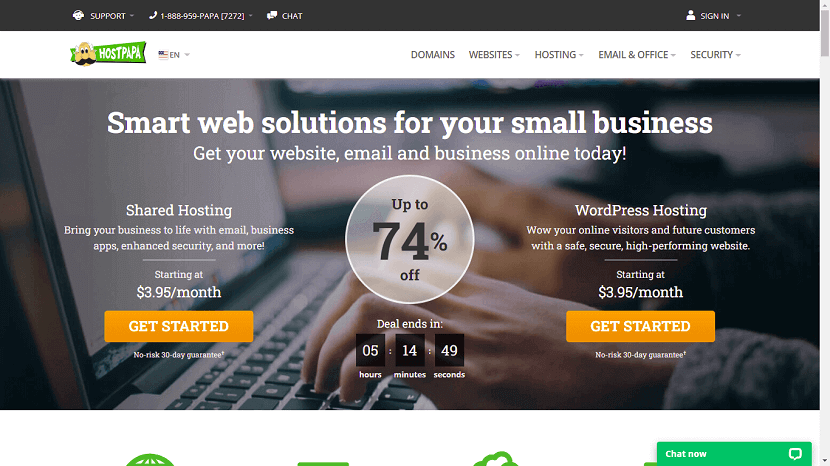
Quality hosting requires speed, security, and a solid interface. HostPapa does it right by providing an incredible customer service/technical support team, numerous resources for completing your own hosting homework, and the security and uptime guarantee that you need.
HostPapa has a strong set of shared, WordPress, reseller, and VPS hosting plans for every sized business. That’s why we want to take a deeper dive into HostPapa’s infrastructure. You’ll learn about what the company has to offer, how it keeps its plan prices low, and how to navigate its dashboard. Let’s get to it.
Feature
- Free Domain Registration
- Free Website Transfer
- Free Cloudfare CDN
- Free one-on-one Training Session
- Free let's Encrypt SSL
- Softaculous with 400+ FREE Apps
- Easy to Use cPanel ( Control Panel )
- Starter Website Builder
- 1-click installs for WordPress, Magento, Drupal, Joomla etc.
- CloudLinux Servers
- Unmetered bandwidth
- 27/7 Support
- 99.9% Uptime
- 30 Day Money Back Guarantee - No risk*
What are the Pros and Cons of HostPapa?
Here’s a wrap on the positives of HostPapa plus a few potential cons.
Pros
- Highly Secured Data Centers.
- 24-Hour Support and 99.9% uptime guarantee.
- Higher-end plans have easy integration with Hostpapa’s online store builder and applications like Facebook.
- Support offered in multiple languages and access to live chat.
- Hostpapa’s cPanel is easy to navigate with a search bar at the top so you can quickly find different functions.
Cons
- You must pay upfront for the hosting package (and site builder). This could be expensive for small businesses.
- It’s not a standalone product so you’ll have to pay for extra features.
How Does HostPapa Keep Your Site Secure?
HostPapa provides its clients with the strongest levels of data encryption available. These security features are packed with:
- State-of-the-art data encryption : HostPapa SSL uses up to 256-bit data encryption to convert data into virtually impenetrable code that is safe from hackers and identity thieves.
- Your SSL certificate in minutes : When you need an SSL certificate, you need it fast. HostPapa will validate your domain registration, and your GlobalSign Secure SSL certificate can be issued within minutes.+
- Over 99% browser compatibility : A GlobalSign SSL certificate is compatible with over 99% of web browsers, ensuring encryption will work for just about every browser used to view your site.
- Automated installation : If your website is hosted with HostPapa, your new SSL certificate will be automatically installed after you complete the validation process.
Frequently Asked Questions About HostPapa
1. Which hosting plan should I choose: Starter, Business, or Business Pro?
The plan you choose will depend on your specific hosting needs. All plans offer unlimited bandwidth.
The Starter plan only includes hosting for two websites, so you won’t want to choose that plan if you’re going to have more than two websites.
The basic Business plan allows you to host unlimited domains and have unlimited email accounts.
The Business Pro plan has all the same features, plus a few advanced ones. It also includes features like domain privacy, SiteLock Website Protection, SSL certificate, and Automated Website Backup at no extra charge.
2. Can I choose month-to-month billing?
No, you must pay for a minimum of 12 months.
3. What other billing cycles do they offer?
You can choose to pay for 12 months, 24 months, or 36 months at a time. The longer the billing cycle you choose, the greater your discount, which will be applied to your monthly rate.
4. What types of payment do they accept?
You can pay via credit card (Visa, Mastercard, Discover) or PayPal.
5. Is there a money-back guarantee?
Yes, HostPapa offers a 30-day money-back guarantee.Within the first 30 days of signing up, you can cancel and get a refund for any hosting fees.
However, domain registration fees are not refundable.
After 30 days, you can cancel anytime, but you won’t receive a refund if you’ve paid ahead.
6. What is domain privacy?
Whenever anyone registers a domain, their information is publicly displayed in the WHOIS domain registry database. This information includes your name, address, phone number, and email address.When you purchase domain privacy for a yearly fee, your domain registrar’s company information will be displayed instead of your own personal information.
What are the types of web hosting?
This answer will be different for everyone. It depends on the type of website you have, the resources you need, your budget, and traffic.
We gave our top recommendation for each category in this guide, so that’s the best place for you to start your search.
Once you know what you need, you can narrow your options. To figure out what category you fall in, here’s a quick recap of the different hosting types and who they are for:
- Shared Hosting — Shared hosting is the most cost-effective plan for entry-level websites.
- VPS Hosting — VPS hosting is for websites that have outgrown shared hosting.
- WordPress Hosting — WordPress hosting optimized for WordPress sites.
- Dedicated Hosting — Dedicated hosting is Enterprise-level servers for large websites.
- Cloud Hosting — Cloud hosting is best for websites that are growing rapidly.
- Reseller Hosting — Reseller hosting is for agencies, web developers, and web designers.
- Managed Hosting — Managed hosting is an IT hosting model in which the client leases servers or cloud computing resources.
- Colocation Hosting — Colocation hosting is where you rent space for your IT hardware at a 3rd party provider’s data center facility.
- Self Service Hosting — Self hosting is a form of running your own website or application by setting up a server and network yourself.
- Cluster Hosting — A cluster hosting is a host that is configured to take over the role of another host server within a cluster.
Alternatives - Web Hosting Providers
If you want to explore more web hosting plans, here is some web hosting services provider companies as below:
Read More : You can explore here 30+ Best Web Hosting and Domain name Providers 2023
Video - Best Web Hosting For Small Business
Affordable Website Hosting for your domainIf you found this article helpful, we encourage you to share it on your social media platforms—because sharing is caring! For more information about article submissions on our website, feel free to reach out to us via email.
Send an emailWritten by RGB Web Tech
Latest Technology Trends
Latest technology trends shaping the future, including AI advancements, blockchain innovation, 5G connectivity, IoT integration, and sustainable tech solutions. Explore breakthroughs in quantum computing, cybersecurity, augmented reality, and edge computing. Stay ahead with insights into transformative technologies driving innovation across industries and revolutionizing how we live, work, and connect.
tsoHost Web Hosting Review
Last updated on January 19, 2025 by RGB Web Tech

Tsohost was founded more than 15 years ago in the UK and they take pride in their aim to make web hosting simple, scalable and secure, and all at affordable prices. In 2009, they launched an innovative backup system which secures all customer data on a daily basis, making themselves pioneers in the industry. At present, they are considered to be one of the largest hosting providers in the country.
Features
- 16 vCPU
- 32 GB RAM
- 800 GBNVMe SSD Storage
- 3 Additional IPs
- Unlimited Bandwidth
- 1Basic migration
- 1eCommerce migration
- 99.9% Uptime SLA
Why choose Tsohost?
In online reviews, our customers wax lyrical about the speed of our web hosting solutions and the capability of our support team. Lip service is also paid to how flexible tsoHost’s hosting plans are, and how secure our solutions are. This is in no small part due to the fact that our main data center is based in the UK.
Fanfare is also made about the following nuggets of tsoHost’s web hosting services.
- Stellar Security: Your hosting solution is secured with our advanced firewalls and multiple enhanced levels of security.
- 30 day money-back guarantee: We’re sure you’ll love your hosting solution, which is why we’ll give your money back if you don’t.
- Superior customer service: You receive expert 24/7 support. All of our team goes through intensive training to ensure they’re at the top of the industry.
- We keep things simple: We know you’re busy running your business. That’s why we like to keep things simple – so you can focus on what matters.
- Built for performance: You can be sure to receive industry leading performance. Our data center ensures top performance thanks to its bespoke 150-meter dark fiber network ring, multi-homed Border Gateway Protocol network, and cooling infrastructure.
Frequently Asked Questions About TsoHost
Here are a few common questions asked about TsoHost.
1. Who owns TsoHost?
In short, TsoHost is owned by Paragon, which is owned by Host Europe Group (HEG) which is owned by GoDaddy. Here’s more detail:
- TsoHost is owned by Paragon Internet Group, Ltd.
- Paragon was acquired by Host Europe Group (HEG) in 2015, and now operates as a subsidiary of HEG.
- GoDaddy EMEA acquired HEG in December 2016 for $1.79 billion. (At the time of acquisition, HEG was owned by the international private equity firm Cinven, which acquired the business in August 2013.)
2. How do I choose between Linux and Windows, and what is TsoHost’s “Hybrid” mode?
- Linux : Linux is recommended if you’re using PHP-based applications. Common examples include Drupal, WordPress, Magento, Joomla, Yii, and CodeIgniter.
- Windows : Choose Windows if you will run ASP/.NET based software. Examples include Sitecore, DotNetNuke, Umbraco, and Kentico. Running PHP through Windows, while possible, is suboptimal.
- Hybrid : TsoHost’s Hybrid mode will enable you to run PHP and ASP simultaneously. Your PHP code will run through their Linux cluster. Your ASP code will run through their Windows cluster.
This means you can run PHP and ASP code on the same sites, and from a single dashboard. TsoHost adds: “The bias determines whether code other than PHP/ASP (i.e. raw HTML) is run through Windows or Linux.
3. How do I find out about status issues with TsoHost?
Visit their Status Center. In the left-hand margin you’ll see categories to search for current status of service. You will also find a list of incidents and announcements of any upcoming scheduled maintenance. To report an incident you can raise a new support ticket or call them at their U.K. number. If you’ve detected what you believe to be a security vulnerability, use the TsoHost Report Security Issue form.
4. Is TsoHost good?
In addition to reading reviews, here are some ways to determine this for yourself.
- Read customer reviews : The TsoHost website states that they have “an average customer rating of 4.9 out of 5 stars, based on a total of 678 reviews.” Browse the web for other sources of customer reviews.
- Browse the TsoHost site for testimonials from customers. If you are a small business owner, you may want to contact one or more individuals featured in the videos to get an updated (current, 2018) assessment from them of TsoHost’s performance.
- Consider your geographic location. Realize that TsoHost phone support operates on U.K. time. Does that work for you?
5. What are the types of web hosting?
This answer will be different for everyone. It depends on the type of website you have, the resources you need, your budget, and traffic.
We gave our top recommendation for each category in this guide, so that’s the best place for you to start your search.
Once you know what you need, you can narrow your options. To figure out what category you fall in, here’s a quick recap of the different hosting types and who they are for:
- Shared Hosting — Shared hosting is the most cost-effective plan for entry-level websites.
- VPS Hosting — VPS hosting is for websites that have outgrown shared hosting.
- WordPress Hosting — WordPress hosting optimized for WordPress sites.
- Dedicated Hosting — Dedicated hosting is Enterprise-level servers for large websites.
- Cloud Hosting — Cloud hosting is best for websites that are growing rapidly.
- Reseller Hosting — Reseller hosting is for agencies, web developers, and web designers.
- Managed Hosting — Managed hosting is an IT hosting model in which the client leases servers or cloud computing resources.
- Colocation Hosting — Colocation hosting is where you rent space for your IT hardware at a 3rd party provider’s data center facility.
- Self Service Hosting — Self hosting is a form of running your own website or application by setting up a server and network yourself.
- Cluster Hosting — A cluster hosting is a host that is configured to take over the role of another host server within a cluster.
Alternatives - Web Hosting Providers
If you want to explore more web hosting plans, here is some web hosting services provider companies as below:
Read More : You can explore here 30+ Best Web Hosting and Domain name Providers 2023
Video - Best Web Hosting For Small Business
Affordable Website Hosting for your domainIf you found this article helpful, we encourage you to share it on your social media platforms—because sharing is caring! For more information about article submissions on our website, feel free to reach out to us via email.
Send an emailWritten by RGB Web Tech
Latest Technology Trends
Latest technology trends shaping the future, including AI advancements, blockchain innovation, 5G connectivity, IoT integration, and sustainable tech solutions. Explore breakthroughs in quantum computing, cybersecurity, augmented reality, and edge computing. Stay ahead with insights into transformative technologies driving innovation across industries and revolutionizing how we live, work, and connect.
What is Shared Web Hosting?
Last updated on January 19, 2025 by RGB Web Tech

Deciding on the hosting service for a website can be tough. Hosting service providers offer different packages and plans, which can leave you confused about which one to choose. To hit the right note, you should gain information about different types of hosting plans and pick the correct one based on your needs.
Shared web hosting can be a good choice when your website is still in its infancy and has not been expanded to require specific resources and access. But in most cases, there is a day when shared hosting will no longer meet the needs of your website. The advantages of shared hosting and also disadvantages of shared hosting can make them a viable choice or a troublesome limitation depending on your circumstances and needs. In the remainder of this article,
Here we discuss what is shared hosting that comes as a popular choice for many users launching their first website. In the following paragraphs, we will examine shared hosting pros and cons to determine the strengths and weaknesses of this type of hosting.
What Is Shared Hosting Meaning?
Shared hosting means are the most affordable option to use for running a website. As a shared web hosting definition, multiple sites share a single server when they run on shared hosting. That’s the reason why these services come at a lower price compared to the dedicated ones.
In most cases, the user doesn’t know other users who share the server. But, all users have access to the platform of the server to see the databases, find out about email accounts, and access other provided features. The allowed capacities are limited by the service provider, which is often described in the details of the package you buy.
Generally speaking, a shared hosting server is proper for a personal weblog, startups, local businesses, or other small websites that don’t need very high bandwidth or professional settings. Websites with high volume should go for VPS or other dedicated options available on the market. Owners of these sites can take advantage of more in-depth controls and more stable performance if they choose plans with higher prices than the shared hosting. In the past article, we have mentioned the advantages of shared hosting.
How Does Shared Hosting Work?
Shared hosting plans are cheap and affordable. Before you go ahead with it, you will come across the need to figure out what is shared web hosting and how it works. Shared hosting is where you will be provided with hosting space in a server, which hosts multiple other websites. It can even contain hundreds or thousands of websites. The server resources, including processing speed, RAM, and hard drive space, are shared between all the websites hosted. Due to the same reason, the performance of your website hosted on the shared hosting server can be affected by another website’s performance on the same server. This is something that you will need to be mindful of.
Advantages of Shared Hosting
Now you have answers to the question of what is shared hosting. There are some drawbacks and benefits of shared web hosting that you must know before deciding whether or not to use this kind of web hosting. In the following, we are going to mention some of the benefits first:
1. Cost-Effective: One of the advantages of shared hosting is being cheap; shared hosting services are the cheapest type of hosting services you can supply. In this type of service, the resources of a server are divided into several hundred or even several thousand websites. As a result, the cost per user is significantly reduced. The pricing plans you find for these services fall somewhere between $2.5 to $10 per month.
2. Simple User Interface: One of the main benefits of shared hosting is a simple user interface. Shared hosting is generally managed by control panels. This means that when you purchase the service, you are provided with a web interface with the ability to make changes, upload, create a site and add domains, and more. Due to the simple user interface in these types of management panels, you no longer need to have high knowledge of Linux or Windows servers and can use your service without paying attention to the details. The control panels provided on these services are generally Plesk, Cpanel or Solidcp.
3. Security : As with other shared hosting services, security is of particular importance. If there is a security problem with these types of services, this deficiency can cause problems for a large number of services running on that server or all of them. For this reason, companies offering these types of services are particularly sensitive to their security checks and even to the limitations of protecting users, so you don’t have to worry about security. Periodic server updates, data backups, restrictions on service changes, and the inability to use some protocols are security issues that generally apply to these services.
4. Support : One of the main shared hosting benefits is that it does not require server management. As mentioned above, server-side security issues are controlled by the provider on an ongoing basis in shared services. But security reviews are not the only things that need to be done to make a service sustainable. Hosting networks are generally complex systems, and because of this complexity, the possibility of disruption or a technical difficulty is very high. Investigating and resolving such cases can, in many cases, require increased knowledge and hours, or even days. It is up to the server to monitor and resolve such problems in shared services.
Technical support is another strength and benefit of shared web hosting that can, in many cases, make your work easier and return valuable hours to you. Generally, quality hosting services provide relatively extensive technical support. The technical teams prevent the services from being interrupted by a 24-hour review and investigation of the services and will resolve the interruptions as soon as possible. More importantly, you can contact your hosting service support experts at any time in different ways to investigate and troubleshoot any issues that may arise on these services.
5. Scalable : Scalability is among the important advantages of shared hosting. Since new and small sites don’t see much traffic, shared hosting works best for them. This feature allows them to remain within limits established by many users drawing from a shared server’s finite resources. In fact, shared hosting solutions are not just for personal website owners and casual bloggers. It can handle up to 100,000 visitors a month, translating to roughly over 3000 visitors daily. When a website gets to a certain level of monthly traffic, it may need to upgrade to a different rank of shared hosting or switch to another hosting entirely.
In sum, shared hosting services may require you to hire a server administrator to maintain the service. This type of support and management of service is generally not provided on virtual servers or will be significantly limited.
6. You Can Host Multiple Domains : You can have multiple domains under the user directory while using a shared hosting plan. The hosting provider will deliver a convenient interface, which you can use to manage all the websites. This interface can help you to overcome complexity in managing multiple websites.
7. It’s Professionally Managed : The maintenance cost associated with shared hosting is low. In fact, you will be able to manage the website as well professionally. All you have to do is seek the assistance of a professional team and hand over the job to them.
8. It Can Host Dynamic Websites: Dynamic websites are the websites that change dynamically based on how a user is browsing. Quora, Facebook, and Twitter are perfect examples of such dynamic websites. They are usually based on content management systems. You can easily host a dynamic website within your shared hosting plan.
Disadvantages of Shared Hosting
We have mentioned some benefits of shared hosting. There are also some factors that explain why shared hosting is bad for some businesses:
1. Resource Constraint : In shared hosting, the resources provided to your site are limited, and the overall server resources are shared among all users; this is one of the leading shared hosting drawbacks. Resource constraints become more critical when your site expands and needs more resources to operate. Lack of resources can severely impact your site’s performance, slow down the site, or interrupt loading. If the site in question uses more resources than what is specified by the server, access to the service may be restricted by the provider rules.
2. Lack of Full Access : One of the main Disadvantages of Shared Hosting is a lack of access. As mentioned earlier, shared hosting services have limitations on the amount and type of user access to server settings. This could be due to security issues or the impact of changes to other users’ services. If you need to make any changes to the server for any reason, you should discuss this with the server to make these changes if possible. In many cases, such changes cannot be made to these services. In fact, you do not have much authority for changes in shared services.
3. Influenceable : Shared services generally have a lot of investigations to control the quality of service. Different websites operate typically in the range of resources provided to them, using the Isolated Application Pool, which essentially prevents over-consumption on one website and affects it on other websites. However, there are other problems that if happen to other websites, can negatively impact your website.
For example, sending spam by a website can place the IP of the email service in the RBLs (which collect the IP of the spam senders). Since IP is shared in these services, this can also affect sending emails by your domain, and your sent emails are known to be spam.
4. Less Stable : Technologies such as cloud hosting, load balancing, and redundancy have greatly increased the ability of servers to provide more stable services. However, shared services are still less stable than dedicated services. The issues mentioned in previous sections are among the reasons that influence the sustainability of shared services. If your website requires a very high level of service sustainability, even the best-shared services may not meet your needs.
5. Insufficient Support: Insufficient support is one of the big shared hosting cons. Shared hosting companies often assert to provide easy support, but this support might not be enough. In other words, if the website meets head-on a problem, they might not be able to help you with that. If your problem goes under, they will just restart it for you.
If you ask why it continues going under, they might be unaware. And in the end, you might soon find out that you are talking to someone who is not a professional WordPress pro, but instead someone who is a newcomer and is reading from a prepared FAQ. If you have bigger problems, you have to call an expert help from outside, which could cost a lot for you.
6. More Vulnerable Against Security Issues : Another disadvantage of shared hosting is vulnerability to Security Issues and because of which you should just stay away from it. If a hacker hacks any website on a server, then other websites also face the potential threat. And if the main server itself gets hacked, then every website on the server threats Simultaneously. So, if you should try to work without mistakes, your website is at risk in a shared hosting environment.
7. Extra Payment For SSL Certificates : In general, you have no problem with the initial cost of shared hosting, because it is not high, but when you want to add a feature, you have to spend more. that is one of the main shared hosting disadvantages. One of these features is SSL certificates. Many shared hosting companies don’t prepare SSL certificates for free, and this causes your website to show a “Not Secure” warning.
However, these certificates are actually available for free. But, you still result up paying for them on shared hosting. So the cost of SSL Certificates becomes one of the biggest shared hosting disadvantages because you have to add up the cost of buying it from shared hosting.
Who Should Buy a Shared Hosting Server?
Overall, for those who are starting a website from the ground up, there is no alternative to shared hosting. It’s by far the best choice for this group of users. Also, shared hosting is the right fit for those who can’t invest much in their hosting and need to keep their costs down. Beginner users with little experience regarding website management who choose Joomla and WordPress cms as their CMS could also benefit from this service extensively. Furthermore, in the beginning, it’s hard to predict how much space and requirements a website needs precisely. To this end, shared hosting is a proper flexible solution that allows you to manage the unknowns easier.
Things To Consider When Choosing a Shared Hosting Plan
Upon understanding what is shared website hosting and the benefits of shared web hosting, you will need to explore the factors that can contribute towards the best results out of your shared hosting plan. Here are some important tips that you need to consider as you try to obtain your shared hosting plan.
1. Uptime : One of the very first things you should do as of now is to take a look at the uptime. If the shared hosting plan is leading you to continuous downtimes, you will end up with struggles. This is why you should be mindful of the uptime. You can then make your website available for visitors at all times.
2. Speed : Next, you should be mindful of safety. No person would like to wait for more than 3 seconds for a page of your website to load. While keeping this in mind, you should pay extra attention to the speed of the website.
3. Security : Shared hosting can be risky as your server will be shared with numerous other entities. This is why you should be mindful of the security of the website. Then you will be able to keep it away from threats.
4. Resources : There should be enough resources available for you to host the website. This is something that you should double-check and see. If not, you will run into struggles because of a lack of resources.
5. Easy to use dashboard : You never expect to go through any struggles when using the web hosting account. This is why you should check and see whether an easy-to-use dashboard is available or not.
6. Support : Last but not least, you need to make sure that proper support is available to you. Then you can get answers to all the questions you have promptly.
When we not use Shared Hosting
Your site is facilitated on a standard server with numerous different sites with shared Hosting. Subsequently, the server is arranged to permit well-known structures, for example, WordPress, to run effectively with traditional settings. To use a custom website system that isn’t introduced on the server or improve server assets for webpage explicit undertakings, it is likely best to use a web hosting or devoted hosting program. These projects require much more information and framework the executive’s experience, yet they permit you to alter the server precisely to your necessities.
Introducing WordPress or utilizing essential coding, for example, HTML or CSS, doesn’t need root access and is effectively finished with the underlying arrangement of a joint facilitating account. Email, essential security strategies, such as ModSecurity, Sucuri, and SSL testaments, likewise don’t need root access and can be applied rapidly without broad information.
Except if you want root admittance to introduce programming or unique settings, shared Hosting is the best spot to begin. Nonetheless, on the off chance that you wish to teach particular programming or set up another server to set up and run your site, consider Hosting a VPS or committed server.
Why Start with Shared Hosting?
Shared Hosting is the least complicated type of web Hosting to begin. Progressed server settings expect you to oversee server assets and upgrade server settings yourself. In a joint program, this is dealt with for you! Likewise, you can pick a joint undertaking with the support that your business needs—that way, you just get compensation for what you use. Assuming you at any point expected to change to a VPS or devoted hosting program, you can undoubtedly overhaul your application to something with more control.
In addition to shared Hosting, it is natural to have numerous destinations simultaneously. cPanel, Softaculous, and other engineer devices simplify the same goals, send off new locales, and attempt new things. You can undoubtedly test on different destinations without influencing your center business. Most independent ventures need a little data site to assist them with building mindfulness and cultivating leads while beginning a site.
Likewise, while sending off a site, traffic will probably be low until the site positions in web indexes. Utilizing a standard Hosting plan at this phase of development will assist you with setting aside cash while distinguishing your image, constructing an internet-based presence, and fostering an SEO technique.
Shared Hosting turns out best for primary, centered sites. Online journals, one-page pages, or destinations that sell a little assortment of items or administrations can all function admirably in shared Hosting. WordPress and other well-known substances the executives programming are frequently excellent for shared Hosting when a site has standard, predictable traffic. Some web-based business stages can, without much of a stretch, sudden spike in demand for shared Hosting, even with a wide assortment of items; however, a few scenes perform better compared to other people.
Frequently Asked Questions
Is Shared Hosting Good?
Shared hosting is a suitable option for small businesses that require small websites. Since every website doesn’t need to use its quota, then it works for most of the small businesses. It is really affordable for such organizations and also profitable for web hosting companies.
Is Shared Hosting Secure?
The answer is yes! Shared hosting has the same amount of security risks as other kinds of hosting. If hackers get the chance to hack your website, they can redirect your users to unwanted pages, display unwanted content and spam the customers.
What Is the Purpose of Shared Hosting?
If you are wondering what does shared hosting mean, we should say that it is a kind of web hosting capable of hosting multiple websites on a single server. In this way, several websites can host their website files and utilize the resources together. As a result, the cost for shared hosting plans is much more reasonable than the other kinds of plans.
If you are interested to compare wordpress hosting vs web hosting , this article can help you!
Is Shared Hosting Slow?
One of the most important shared hosting drawbacks is its speed. The performance of your website highly depends on the activity of other websites which are hosted on the same plan and also by the server infrastructure itself.
How Much Traffic Can Shared Hosting Handle?
Good shared hosting is capable of handling about 1.5–2k traffic per hour. It actually depends on how website owners optimize their website pages. With the average size of 700kb to 1.3 MB of website pages, we can say that shared hosting can handle 7–12 k daily traffic without any problem. But for more traffic, users may experience some slow loading issues.
If you are interested in comparing vps vs vds , this article can help you!
Conclusion
In this article, we have mentioned some of the pros and cons of shared hosting that can affect your business. It is important to choose the right kind of Web Hosting service for your website to attract more users to visit your site and also rank higher in SERP. We hope that this article can help you have a better understanding of shared hosting limitations, pros, and cons!
List of Shared Hosting Service Providers
Read More : You can explore here 30+ Best Web Hosting Providers 2023
Video - Best Web Hosting For Small Business
Affordable Website Hosting for your domainIf you found this article helpful, we encourage you to share it on your social media platforms—because sharing is caring! For more information about article submissions on our website, feel free to reach out to us via email.
Send an emailWritten by RGB Web Tech
Latest Technology Trends
Latest technology trends shaping the future, including AI advancements, blockchain innovation, 5G connectivity, IoT integration, and sustainable tech solutions. Explore breakthroughs in quantum computing, cybersecurity, augmented reality, and edge computing. Stay ahead with insights into transformative technologies driving innovation across industries and revolutionizing how we live, work, and connect.
What is an SSL certificate? - Secure Sockets Layer
Last updated on January 19, 2025 by RGB Web Tech
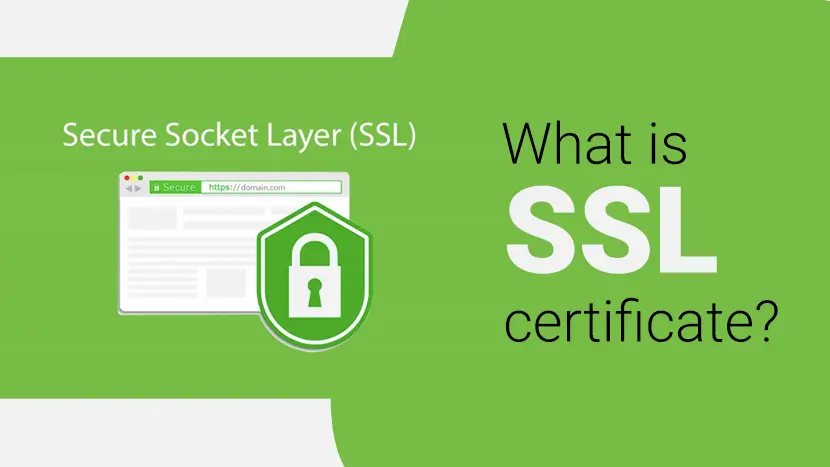
An SSL certificate is a digital certificate that authenticates a website's identity and enables an encrypted connection. SSL stands for Secure Sockets Layer, a security protocol that creates an encrypted link between a web server and a web browser.
Companies and organizations need to add SSL certificates to their websites to secure online transactions and keep customer information private and secure.
In short: SSL keeps internet connections secure and prevents criminals from reading or modifying information transferred between two systems. When you see a padlock icon next to the URL in the address bar, that means SSL protects the website you are visiting.
Since its inception about 25 years ago, there have been several versions of SSL protocol, all of which at some point ran into security troubles. A revamped and renamed version followed — TLS (Transport Layer Security), which is still in use today. However, the initials SSL stuck, so the new version of the protocol is still usually called by the old name.
Comprehensive security and protection for your domain and server
In the modern, connected world, security is a growing concern. Protection of online personal data and privacy from hackers and identity thieves is more important today than ever before. The need for online security, data encryption and protection has increased to the extent that search engines have started penalizing websites that don’t provide secure browsing. In an era where your website can be accessed from just about any internet-enabled device – including mobile phones, tablets, web-enabled home appliances, smart-watches and other smart wearables, you cannot afford to not offer a secure environment to your website visitors.
When a Secure Sockets Layer (SSL) Certificate is installed on your website, it creates a secure browsing environment through the HTTPS protocol. It provides security for sensitive information related to usernames and passwords, credit card and bank information. Search engines like SSL certs and reward websites by increasing their ranking position. Customers tend to trust secure https websites more, so when your website shows up as secure in search engines, searchers are more likely to click on your listing. In turn, this will improve your website traffic and conversion rates. Data is kept safe between web servers, and customers do not need to worry about their information being intercepted. Without an SSL certificate, data sent to the server without encryption can be easily intercepted by hackers or criminals and used for harmful purposes.
How does an SSL Certificate work?
SSL Certificates use a secure transaction called a public key cryptography. This cryptography uses two keys, one is public, and one is private. The public key is used to encrypt messages or information sent over your server. When there is a request for information from a browser, the private key is used to unlock the encrypted message or information as it passes from your server to the browser. The information cannot be accessed anywhere in between the website and server without the private key. A website where the SSL certificate is installed correctly will show its domain name starting with HTTPS instead of HTTP.
SSL Certificates must be obtained from a trusted Certificate Authority with Root Certificates. To have a trusted Certificate, the end user should have the Root Certificate on their machine. If the Root Certificate is not present, the end user will receive error messages. This can cause the end user to bounce off your entrusted website and find a company which is trusted.
How to Install a SSL Certificate?
Flying Cow Design’s engineering team will install the SSL Certificate onto your server. This will ensure a secure connection with all website browsers and your website server. Once your SSL Certificate is successfully installed, you will notice your website address changes from HTTP to HTTPS; meaning it is secure. You and your customers will notice a padlock or ‘green’ address bar, indicating it is a secure website. You can also purchase SSL certificates from us. Check prices below.
How do SSL certificates work?
SSL works by ensuring that any data transferred between users and websites, or between two systems, remains impossible to read. It uses encryption algorithms to scramble data in transit, which prevents hackers from reading it as it is sent over the connection. This data includes potentially sensitive information such as names, addresses, credit card numbers, or other financial details.
The process works like this:
- A browser or server attempts to connect to a website (i.e., a web server) secured with SSL.
- The browser or server requests that the web server identifies itself.
- The web server sends the browser or server a copy of its SSL certificate in response.
- The browser or server checks to see whether it trusts the SSL certificate. If it does, it signals this to the web server.
- The web server then returns a digitally signed acknowledgement to start an SSL encrypted session.
- Encrypted data is shared between the browser or server and the webserver.
This process is sometimes referred to as an "SSL handshake." While it sounds like a lengthy process, it takes place in milliseconds.
When a website is secured by an SSL certificate, the acronym HTTPS (which stands for HyperText Transfer Protocol Secure) appears in the URL. Without an SSL certificate, only the letters HTTP – i.e., without the S for Secure – will appear. A padlock icon will also display in the URL address bar. This signals trust and provides reassurance to those visiting the website.
To view an SSL certificate's details, you can click on the padlock symbol located within the browser bar. Details typically included within SSL certificates include:
- The domain name that the certificate was issued for
- Which person, organization, or device it was issued to
- Which Certificate Authority issued it
- The Certificate Authority's digital signature
- Associated subdomains
- Issue date of the certificate
- The expiry date of the certificate
- The public key (the private key is not revealed)
Why you need an SSL certificate
Websites need SSL certificates to keep user data secure, verify ownership of the website, prevent attackers from creating a fake version of the site, and convey trust to users.
If a website is asking users to sign in, enter personal details such as their credit card numbers, or view confidential information such as health benefits or financial information, then it is essential to keep the data confidential. SSL certificates help keep online interactions private and assure users that the website is authentic and safe to share private information with.
More relevant to businesses is the fact that an SSL certificate is required for an HTTPS web address. HTTPS is the secure form of HTTP, which means that HTTPS websites have their traffic encrypted by SSL. Most browsers tag HTTP sites – those without SSL certificates – as "not secure." This sends a clear signal to users that the site may not be trustworthy – incentivizing businesses who have not done so to migrate to HTTPS.
An SSL certificate helps to secure information such as:
- Login credentials
- Credit card transactions or bank account information
- Personally identifiable information — such as full name, address, date of birth, or telephone number
- Legal documents and contracts
- Medical records
- Proprietary information
Types of SSL certificate
There are different types of SSL certificates with different validation levels. The six main types are:
- Extended Validation certificates (EV SSL)
- Organization Validated certificates (OV SSL)
- Domain Validated certificates (DV SSL)
- Wildcard SSL certificates
- Multi-Domain SSL certificates (MDC)
- Unified Communications Certificates (UCC)
Extended Validation certificates (EV SSL)
This is the highest-ranking and most expensive type of SSL certificate. It tends to be used for high profile websites which collect data and involve online payments. When installed, this SSL certificate displays the padlock, HTTPS, name of the business, and the country on the browser address bar. Displaying the website owner's information in the address bar helps distinguish the site from malicious sites. To set up an EV SSL certificate, the website owner must go through a standardized identity verification process to confirm they are authorized legally to the exclusive rights to the domain.
Organization Validated certificates (OV SSL)
This version of SSL certificate has a similar assurance similar level to the EV SSL certificate since to obtain one; the website owner needs to complete a substantial validation process. This type of certificate also displays the website owner's information in the address bar to distinguish from malicious sites. OV SSL certificates tend to be the second most expensive (after EV SSLs), and their primary purpose is to encrypt the user's sensitive information during transactions. Commercial or public-facing websites must install an OV SSL certificate to ensure that any customer information shared remains confidential.
Domain Validated certificates (DV SSL)
The validation process to obtain this SSL certificate type is minimal, and as a result, Domain Validation SSL certificates provide lower assurance and minimal encryption. They tend to be used for blogs or informational websites – i.e., which do not involve data collection or online payments. This SSL certificate type is one of the least expensive and quickest to obtain. The validation process only requires website owners to prove domain ownership by responding to an email or phone call. The browser address bar only displays HTTPS and a padlock with no business name displayed.
Wildcard SSL certificates
Wildcard SSL certificates allow you to secure a base domain and unlimited sub-domains on a single certificate. If you have multiple sub-domains to secure, then a Wildcard SSL certificate purchase is much less expensive than buying individual SSL certificates for each of them. Wildcard SSL certificates have an asterisk * as part of the common name, where the asterisk represents any valid sub-domains that have the same base domain. For example, a single Wildcard certificate for *website can be used to secure:
- Payments.yourdomain.com
- Login.yourdomain.com
- Mail.yourdomain.com
- Download.yourdomain.com
- anything.yourdomain.com
Multi-Domain SSL Certificate (MDC)
A Multi-Domain certificate can be used to secure many domains and/or sub-domain names. This includes the combination of completely unique domains and subdomains with different TLDs (Top-Level Domains) except for local/internal ones.
For example:
- www.example.com
- Example.org
- Mail.this-domain.net
- Example.anything.com.au
- Checkout.example.com
- secure.example.org
Multi-Domain certificates do not support sub-domains by default. If you need to secure both www.example.com and example.com with one Multi-Domain certificate, then both hostnames should be specified when obtaining the certificate.
Unified Communications Certificate (UCC)
Unified Communications Certificates (UCC) are also considered Multi-Domain SSL certificates. UCCs were initially designed to secure Microsoft Exchange and Live Communications servers. Today, any website owner can use these certificates to allow multiple domain names to be secured on a single certificate. UCC Certificates are organizationally validated and display a padlock on a browser. UCCs can be used as EV SSL certificates to give website visitors the highest assurance through the green address bar.
It is essential to be familiar with the different types of SSL certificates to obtain the right type of certificate for your website.
How to obtain an SSL certificate
SSL certificates can be obtained directly from a Certificate Authority (CA). Certificate Authorities – sometimes also referred to as Certification Authorities – issue millions of SSL certificates each year. They play a critical role in how the internet operates and how transparent, trusted interactions can occur online.
The cost of an SSL certificate can range from free to hundreds of dollars, depending on the level of security you require. Once you decide on the type of certificate you require, you can then look for Certificate Issuers, which offer SSLs at the level you require.
Obtaining your SSL involves the following steps:
- Prepare by getting your server set up and ensuring your WHOIS record is updated and matches what you are submitting to the Certificate Authority (it needs to show the correct company name and address, etc.)
- Generating a Certificate Signing Request (CSR) on your server. This is an action your hosting company can assist with.
- Submitting this to the Certificate Authority to validate your domain and company details
- Installing the certificate they provide once the process is complete.
Once obtained, you need to configure the certificate on your web host or on your own servers if you host the website yourself.
How quickly you receive your certificate depends on what type of certificate you get and which certificate provider you procure it from. Each level of validation takes a different length of time to complete. A simple Domain Validation SSL certificate can be issued within minutes of being ordered, whereas Extended Validation can take as long as a full week.
Can an SSL certificate be used on multiple servers?
It is possible to use one SSL certificate for multiple domains on the same server. Depending on the vendor, you can also use one SSL certificate on multiple servers. This is because of Multi-Domain SSL certificates, which we discussed above.
As the name implies, Multi-Domain SSL Certificates work with multiple domains. The number is left up to the specific issuing Certificate Authority. A Multi-Domain SSL Certificate is different from a Single Domain SSL Certificate, which – again, as the name implies – is designed to secure a single domain.
To make matters confusing, you may hear Multi-Domain SSL Certificates, also referred to as SAN certificates. SAN stands for Subject Alternative Name. Every multi-domain certificate has additional fields (i.e., SANs), which you can use to list additional domains that you want to cover under one certificate.
Unified Communications Certificates (UCCs) and Wildcard SSL Certificates also allow for multi-domains and, in the latter case, an unlimited number of subdomains.
What happens when an SSL certificate expires?
SSL certificates do expire; they don't last forever. The Certificate Authority/Browser Forum, which serves as the de facto regulatory body for the SSL industry, states that SSL certificates should have a lifespan of no more than 27 months. This essentially means two years plus you can carry over up to three months if you renew with time remaining on your previous SSL certificate.
SSL certificates expire because, as with any form of authentication, information needs to be periodically re-validated to check it is still accurate. Things change on the internet, as companies and also websites are bought and sold. As they change hands, the information relevant to SSL certificates also changes. The purpose of the expiry period is to ensure that the information used to authenticate servers and organizations is as up-to-date and accurate as possible.
Previously, SSL certificates could be issued for as long as five years, which was subsequently reduced to three and most recently to two years plus a potential extra three months. In 2020, Google, Apple, and Mozilla announced they would enforce one-year SSL certificates, despite this proposal being voted down by the Certificate Authority Browser Forum. This took effect from September 2020. It is possible that in the future, the length of validity will reduce still further.
When an SSL certificate expires, it makes the site in question unreachable. When a user's browser arrives at a website, it checks the SSL certificate's validity within milliseconds (as part of the SSL handshake). If the SSL certificate has expired, visitors will receive a message to the effect of — "This site is not secure. Potential risk ahead".
While users do have the option to proceed, it is not advisable to do so, given the cybersecurity risks involved, including the possibility of malware. This will significantly impact bounce rates for website owners, as users rapidly click off the homepage and go elsewhere.
Keeping on top of when SSL certificates expire presents a challenge for larger businesses. While smaller and medium-sized businesses (SMEs) may have one or only a few certificates to manage, enterprise-level organizations that potentially transact across markets – with numerous websites and networks – will have many more. At this level, allowing an SSL certificate to expire is usually the result of oversight rather than incompetence. The best way for larger businesses to stay on top of when their SSL certificates expire is by using a certificate management platform. There are various products on the market, which you can find using an online search. These allow enterprises to see and manage digital certificates across their entire infrastructure. If you do use one of these platforms, it is important to log in regularly so you can be aware of when renewals are due.
If you allow a certificate to expire, the certificate becomes invalid, and you will no longer be able to run secure transactions on your website. The Certification Authority (CA) will prompt you to renew your SSL certificate before the expiration date.
Whichever Certificate Authority or SSL service you use to obtain your SSL certificates from will send you expiration notifications at set intervals, usually starting at 90 days out. Try to ensure that these reminders are being sent to an email distribution list — rather than a single individual, who may have left the company or moved to another role by the time the reminder is sent. Think about which stakeholders in your company are on this distribution list to ensure the right people see the reminders at the right time.
How to tell if a site has an SSL certificate
The easiest way to see if a site has an SSL certificate is by looking at the address bar in your browser:
- If the URL begins with HTTPS instead of HTTP, that means the site is secured using an SSL certificate.
- Secure sites show a closed padlock emblem, which you can click on to see security details – the most trustworthy sites will have green padlocks or address bars.
- Browsers also show warning signs when a connection is not secure — such as a red padlock, a padlock which is not closed, a line going through the website's address, or a warning triangle on top of the padlock emblem.
How to ensure your online session is safe
Only submit your personal data and online payment details to websites with EV or OV certificates. DV certificates are not suitable for eCommerce websites. You can tell if a site has an EV or OV certificate by looking at the address bar. For an EV SSL, the organization's name will be visible in the address bar itself. For an OV SSL, you can see the organization's name's details by clicking on the padlock icon. For a DV SSL, only the padlock icon is visible.
Read the website's privacy policy. This enables you to see how your data will be used. Legitimate companies will be transparent about how they collect your data and what they do with it.
Look out for trust signals or indicators on websites. As well as SSL certificates, these include reputable logos or badges which show the website meets specific security standards. Other signs that can help you determine if a site is real or not include checking for a physical address and telephone number, checking their returns or refunds policy, and making sure prices are believable and not too good to be true.
Stay alert to phishing scams. Sometimes cyber attackers create websites that mimic existing websites to trick people into purchasing something or logging in to their phishing site. It is possible for a phishing site to obtain an SSL certificate and therefore encrypt all the traffic that flows between you and it. A growing proportion of phishing scams occur on HTTPS sites — deceiving users who feel reassured by the padlock icon's presence.
To avoid these kinds of attacks:
- Always examine the domain of the site you are on and ensure it is spelled correctly. The URL of a fake site might differ by only one character – e.g., amaz0n.com instead of amazon.com. If in doubt, type the domain directly into your browser to make sure you are connecting to the website you intend to visit.
- Never enter logins, passwords, banking credentials, or any other personal information on the site unless you are sure of its authenticity.
- Always consider what a particular site is offering, whether it looks suspicious, and whether you really need to register on it.
- Make sure your devices are well protected: Kaspersky Internet Security checks URLs against an extensive database of phishing sites, and it detects scams regardless of how "safe" the resource looks.
Cybersecurity risks continue to evolve but understanding the types of SSL certificates to look out for and how to distinguish a safe site from a potentially dangerous one will help internet users avoid scams and protect their personal data from cybercriminals.
SSL Certificate Providers
If you want to explore SSL Certificate plans, here is some SSL Certificate services provider companies as below:
Read More : You can explore here 30+ Best Web Hosting Providers 2023
Video - Best Web Hosting For Small Business
Affordable Website Hosting for your domainIf you found this article helpful, we encourage you to share it on your social media platforms—because sharing is caring! For more information about article submissions on our website, feel free to reach out to us via email.
Send an emailWritten by RGB Web Tech
Latest Technology Trends
Latest technology trends shaping the future, including AI advancements, blockchain innovation, 5G connectivity, IoT integration, and sustainable tech solutions. Explore breakthroughs in quantum computing, cybersecurity, augmented reality, and edge computing. Stay ahead with insights into transformative technologies driving innovation across industries and revolutionizing how we live, work, and connect.
Wildcard SSL Certificates - Multi-Domain Security
Last updated on January 19, 2025 by RGB Web Tech
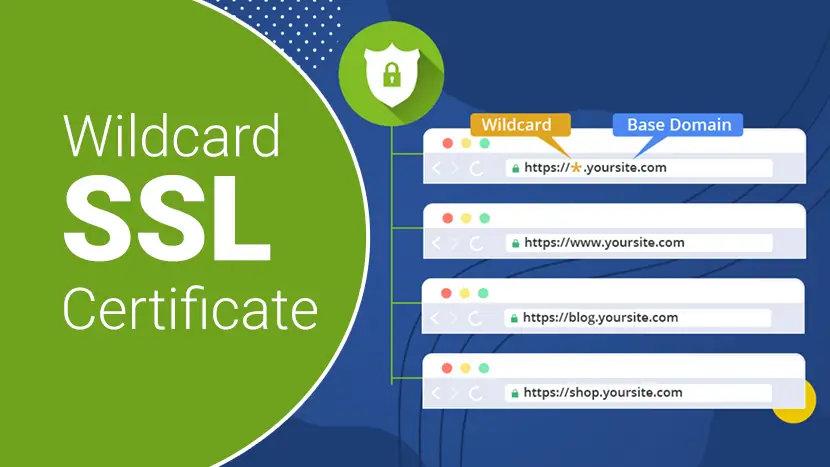
Wildcard SSL certificates are a must-have if you are managing multiple subdomains on the same primary domain. The protection of a single certificate provides security for various subdomains across multiple web servers saving you time and money. With secure browsing becoming increasingly important for search engines, investing in wildcard SSL certificates is becoming increasingly important for businesses with multiple subdomains.
What is a wildcard SSL certificate?
The wildcard SSL certificate is an online resource for multi-domain security, allowing you to secure your main domain along with an unlimited number of subdomains associated with it. When purchasing the wildcard SSL certificate, place an asterisk (*) in front of the domain name like *thisismywebsite.com. The asterisk allows you to own all rights to other first-level subdomains that could be associated with it, such as mail.thisismywebsite.com, products.thisismywebsite.com, and secure.thisismywebsite.com regardless of whether the subdomains are hosted on the same web server or spread across multiple servers.
This extended validation makes it incredibly easy to keep your website protected and secure. Additionally, certifying your website this way means you will not have to purchase individual SSL certificates for each sub domain of your site. When visitors see the certificate authority, they will know any information they put on your website will be secure. It also ensures that you would not be behind your competition on SEO compliance with search engines almost mandating https security through SSL certificates.
How Wildcard SSL Certificate work
Wildcard SSL certificates are also called multi-domain certificates. They use the same validation method as regular SSL certificates. The only difference is that this type of SSL certificate covers multiple domains allowing you to secure more than just one domain.
Wildcard SSL Certificate Features
Below are some of the features of our multi-domain SSL certificates:
- They secure an unlimited number of subdomains on a primary domain.
- We offer a simple purchase and installation process. We also offer assisted installation.
- Subdomains can be on the same web server or spread across multiple servers.
- Our certificates are issued in minutes after domain validation.
- Cross-browser compatibility and support.
- Supports most popular content management systems including WordPress, Drupal, Joomla, etc.
- Seamless HTTPS browsing to facilitate secure browsing mandated by most search engines.
- Ideal for B2B brochureware websites, e-commerce websites and more.
- We offer 256-bit SSL encryption with our SSL certificates
- An easy to use console to manage your SSL certificates.
Wildcard SSL Certificate Benefits
The idea of using a multi-domain wildcard SSL certificate to secure all your secondary domains is certainly intriguing. Here is a quick rundown of a few benefits you will have:
- You can choose the appropriate encryption strength, 40 to 256 bits, for your website, thus giving you the flexibility you need to keep your website running smoothly.
- Wildcard SSL certificates are issued in a short amount of time, meaning your website sub-domains will be secured and protected quickly.
- This SSL certificate comes with a privacy and security guarantee. This is no ordinary benefit, especially if you want to secure a secondary domain for emailing purposes. Your clients want to ensure their messages are kept private and seeing a Wildcard SSL certificate will assure them of their encrypted privacy.
- Finally, these certificates allow you to recertify your website (and any new secondary domain names) within the lifespan of the original certificate. It is just another way you can guarantee that your online space will be protected and authenticated without the hassle of needing to buy new SSL certificates.
- You can rest easy knowing your website is protected by vulnerability scanning making it virtually hacker proof.
A vital part of any website
No matter what you use your website for, be it to sell your products or to simply blog your opinions, a Wildcard SSL certificate will keep your users (and your information) exactly where it belongs: on your website.
Wildcard SSL Certificates Providers
Read More : You can explore here 30+ Best Web Hosting Providers 2023
Video - Best Web Hosting For Small Business
Affordable Website Hosting for your domainIf you found this article helpful, we encourage you to share it on your social media platforms—because sharing is caring! For more information about article submissions on our website, feel free to reach out to us via email.
Send an emailWritten by RGB Web Tech
Latest Technology Trends
Latest technology trends shaping the future, including AI advancements, blockchain innovation, 5G connectivity, IoT integration, and sustainable tech solutions. Explore breakthroughs in quantum computing, cybersecurity, augmented reality, and edge computing. Stay ahead with insights into transformative technologies driving innovation across industries and revolutionizing how we live, work, and connect.
17 Best FREE Web Hosting Services
Last updated on January 19, 2025 by RGB Web Tech

Is free website hosting any good? Well, “free” is always good but not always worth it in the long run. Let me explain:
In short, if you want to run a test website, you’re not expecting to get much from it, and you don’t want to invest any money into it at all, then free website hosting might indeed work for you!
In 95% of other cases, you’re going to be better off with a cheap website hosting plan like Bluehot, Hostinger etc. no more expensive than $2.75 or even $1.99 per month (small businesses or online stores often choose something in this price range).
If you’re in a hurry, here’s a summary of our findings based on the analysis below:
Free website hosting is okay for a hobby project or a proof-of-concept type of project. It’s okay if you want to run a site for a short while, get your data and then shut it off.
For any sort of serious website building project or a site that’s meant to stay online for a long while, you’re better off with an affordable web hosting plan or even a pick from the very best web hosting services out there.
For example, Bluehost is our recommended self-hosted website server. If you check them out through our link, you’ll unlock a special discounted price of $2.75 / mo vs the $3.75 standard entry-level price. You also get a free domain name bundled in.
Alternatively, you might opt for an all-in-one solution. For example, Wix is a good choice for a quick start, covering both hosting and website builder in one place. Although there is a free plan, you can try any premium plan offering 14 days of money-back.
Want to get the full story? We compared 17 best free website hosting options to help you make your decision.
The limitations of free website hosting
In life, you tend to get what you pay for, and web hosting is no exception. If you choose the free hosting route, be prepared for some common issues that come along with it.
Even the best free hosting tends to be fairly unstable, which can result in downtime. Also, providers typically place restrictions on storage space and bandwidth, limiting your site’s growth and traffic capacity. Your personal website or business website may also have slow performance.
That said, there are times you may want to consider free hosting. For a personal project, it may be all you need. The same is true if you’re practicing your web design and web development skills and just want a space to try out new ideas.
Perhaps you’re setting up an area to test new plugins or themes. In that case, the limitations of free hosting shouldn’t be a barrier to what you want to accomplish. Of course, if you simply need a staging site, you may want to use a local development tool, such as Local, and not worry about hosting at all.
However, if you need a live site and don’t want to deal with the drawbacks of free web hosting, there are some affordable alternatives to consider. A cheap host can help you keep your budget low while avoiding poor site availability.
17 Best FREE Website Hosting Services
The good news is that you can test drive free website hosting at no cost to see if it might work for you. If you’ve decided to give it a try, here are 17 options to consider.
1. InfinityFree
InfinityFree is a free web hosting service that boasts a 99.9% uptime guarantee. It offers users:
- An auto-installer with more than 400 different apps, including WordPress
- Free subdomains
- 5 GB disk space
- Unlimited bandwidth
- 400 MySQL databases
- Knowledge base support
You’ll also have access to the Softaculous Script Installer to set up WordPress. This hosting service provider doesn’t offer domain registration, but you can use one you’ve acquired from another registrar.
Once your website is published, your visitors won’t see ads. However, there will be ads in cPanel on the back end. Your site is also limited to 50,000 hits per day.
2. Wix
Wix is a drag-and-drop website builder – similar to tools like Weebly or Squarespace; and yup, you don’t need to be familiar with PHP, like you do with other solutions (e.g. – Joomla).
However, we’re featuring Wix on this list because it’s kind of an all-in-one solution for both a website platform and server space to host that website. Since Wix does come with a free plan, this makes it a free website hosting service as well. This free website builder is a unique way to enjoy awesome site-building features backed by enterprise-grade reliability. On that free plan, you get:
- Wix.com subdomain
- Beautiful templates
- 500 MB disk space
- 500 MB bandwidth
- Global content delivery network
- Free SSL and security monitoring
- Knowledge base and customer support
- Decent load times
Unfortunately, if you’re expecting no ads, you will be disappointed. Just like most of the free web hosting providers, Wix places their own ads on free plan sites. You can only connect a Wix subdomain and would have to move to a paid plan for connecting a custom domain.
The eCommerce functionality is also unavailable in the free version. However, you can still set up things like bookings, events, and forums, and fill in your site with SEO-friendly content with just a few clicks.
3. ByetHost
ByetHost is another free hosting service that you could use. Its plan features:
- Five subdomains
- 1 GB disk space
- 50 GB monthly transfers
- One MySQL database
- 24/7 support via ticket system and knowledge base
ByetHost offers solid support for its free plan, which can be rare. You can access a self-service knowledge base and video tutorials, but a ticketing system is also available.
In addition, you’ll receive usage statistics such as disk space, bandwidth usage, and daily hits. You can find this data in VistaPanel, which is ByetHost’s free hosting control panel. Then, you can use the information to help budget your resources.
4. 000WebHost
000WebHost is a free hosting option from Hostinger. Some of its features include:
- One website
- 300 MB disk space
- 3 GB of bandwidth
- One MySQL database
- Community forum
000WebHost comes with the Zyro website builder, which should make designing your site less intimidating. Like InfinityFree, visitors to your website won’t see ads, but there will be ads in your WordPress dashboard.
Free hosting from 000WebHost doesn’t even require a credit card to set up, and you can use it as long as you like. Also, if you outgrow your free plan, you can easily upgrade to a cheap plan from Hostinger. Hostinger plans start at $1.99 / month for your first billing cycle.
5. Google Cloud Hosting
Google Cloud Hosting isn’t technically free. However, it does offer a one-year free trial that includes:
- One website
- Unlimited storage
- Extensive support documentation
While Google Cloud Hosting is tailored towards large businesses, anyone can use it. To get started, all you need is a Google account.
The free trial lasts for 12 months, or until you’ve used up the $300 credit it includes. After this, you only pay for the resources you use. Google offers a price calculator to help you estimate your costs.
6. AwardSpace
AwardSpace offers a variety of hosting services. It’s best known for its free plan, which includes:
- One website
- Three subdomains
- 1 GB disk space
- 5 GB bandwidth
- MySQL database
- 24/7 live chat
Awardspace includes one-click content management system (CMS) installation as well as the Zacky website builder. Also, the 24/7 live chat is available to free plan users if you have questions.
Once launched, your own website will be ad-free. Plus, you can place ads to monetize it. AwardSpace provides you with the ability to monitor your bandwidth usage as well, which may help you budget your resources.
7. Freehostia
Freehostia offers paid and free hosting. The free plan, called ‘Chocolate’, provides:
- Five websites
- 250 MB disk space
- 6 GB bandwidth
- One MySQL database
- FAQ and ticket support system
Freehostia’s cluster platform aims to offer more reliability from its free hosting. Hopefully, this results in less downtime for your website.
You’ll have access to a website builder complete with templates. If you run into issues, you can have an answer to your support ticket in one hour, even with the free plan.
8. FreeWebHostingArea
FreeWebHostingArea is a volunteer-maintained free hosting service. It offers:
- 1.5 GB disk space
- Unmetered traffic
- MySQL databases
- Free email support
9. W3Schools Spaces
W3Schools Spaces features of the free plan:
- Free templates
- Allow 500 requests/month
- Allow 100MB data and storage/month
- Free SSL
10. Glitch
Glitch features of the free plan:
- Provide 4000 requests/hour
- The server processes 512MN of RAM
- Storage capacity 512MB
- Unlimited static sites
- Support import/export Github function.
11. Fleek
Fleek features of the free plan:
- Support to edit domains
- Provide services https
- 3GB of storage
- Unlimited websites
- Automatically deploy on Git
- 250 minutes to build and 50GB of bandwidth
- Free SSL
12. Netlify
Netlify features of the free plan:
- Automatically built from Git
- Deployed on the global edge network
- Bandwidth: 100GB/Month
- Number of websites: Unlimited
- Restorable to any version
- Provides a free CLI.
13. Render
Render features of the free plan:
- 100GB/month for bandwidth and storage
- Lightning-fast CDN
- Can custom domain with full SSL functionality
- Automatically deploy on Git
14. Surge
Surge features of the free plan:
- Provides 404.html page functionality
- Unlimited websites and APIs
- Can custom domain
- Easy to deploy via CLI
- Unlimited websites.
15. Vercel
Vercel features of the free plan:
- Improve website performance with Edge Network
- Unlimited websites and APIs
- Can custom domain with full SSL functionality
- Provides Serverless Functions
- 100GB bandwidth/month
- Automatically optimize images (1000 images for the free version)
16. Firebase
Firebase features of the free plan:
- 10 GB of storage
- 360MB Bandwidth/day
- You can edit your website’s domain name
- Allows multiple pages to be added to the same project
- SSL support.
17. HyperPHP
HyperPHP is a free hosting and domain service for personal websites. Its plan offers:
- 1 GB disk space
- Free subdomains
- MySQL database
- Free tech support and community forums
HyperPHP offers a few ways to make launching a new website easy. Firstly, a free domain transfer is available. This host also offers an automatic script installer, which you can access through VistaPanel.
FAQs - Free Web Hosting
1. Is free web hosting reliable?
Answer : No, free web hosting isn’t reliable. Most free web hosting has absurdly limited resources and you’re also likely to run into multiple issues. This includes poor performance, complicated interface, compromised security, and ads on your website. Not to mention questionable terms of service.
2. Can I get free hosting and a domain?
Answer : Free hosting and domain is rarely possible, none of the providers here has such a deal. However, many hosts offer free subdomain hosting. You can choose a desired name for your site, but it will look something like this: desiredname.freehosting.com.
3. Can I use free hosting for selling online?
Answer : Yes, as long as you can host WordPress and install WooCommerce on your paid plan, it's possible to sell online using free hosting. Yet, it’s extremely likely to cause many problems and potentially ruin the seller/buyer relationship. If your online store is always down or very slow, the buyers will simply go to more professional sites.
4. Can I host my own website?
Answer : Yes, you can host your own website if you have the tech skills and 100% uninterrupted network. It will require significant skills, technical know-how, resources, and time among other things. Plus, many Internet service providers also forbid personal hosting.
5. Does it matter where you host your website?
Answer : Yes. With a bad hosting provider, your website may be plagued with slow loading times, a lack of proper security, and extensive downtime. It’s really important to choose a web host with a discerning eye.
Conclusion
While your free web hosting platform might not be perfect, it can be a viable option in some scenarios. However, finding a quality provider that delivers on its promises is no easy task.
In this article, we shared our opinions on the 17 best free website hosting options available. You have nothing to lose by giving one a try. Our top pick in the category of best free web hosting is AwardSpace for its 24/7 live chat support and easy WordPress installation.
However, for any type of serious project, we recommend using at least a cheap paid shared hosting service. In our collection of cheap web hosting sites, you’ll find services that cost just a few dollars per month.
As we mentioned earlier in this post, you can get quality, affordable website hosting like Bluehot, Hostinger etc. for $2.75 or even $1.99 per month
Recommendation - Paid Web Hosting Service Providers
If you are looking for safe and secure website hosting, we recommend to use paid web hosting services.
Read More : You can explore here 30+ Best Web Hosting Providers 2023
Video - Best Web Hosting For Small Business
Affordable Website Hosting for your domainIf you found this article helpful, we encourage you to share it on your social media platforms—because sharing is caring! For more information about article submissions on our website, feel free to reach out to us via email.
Send an emailWritten by RGB Web Tech
Latest Technology Trends
Latest technology trends shaping the future, including AI advancements, blockchain innovation, 5G connectivity, IoT integration, and sustainable tech solutions. Explore breakthroughs in quantum computing, cybersecurity, augmented reality, and edge computing. Stay ahead with insights into transformative technologies driving innovation across industries and revolutionizing how we live, work, and connect.






